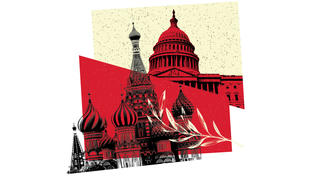Features
A Cautiously Hopeful Picture of Russia-U.S. Relations

Illustration by Ian Riley
From film to books to political discourse, Russia has been a major figure in American minds for decades. And as headlines about the country’s aggression in Asia and its government’s interference in international elections dominate the news, many wonder if there may soon be a return to the days of the Cold War, where Russia and the United States stood ready with the threat of nuclear weapons looming.
Michael McFaul, author of "From Cold War to Hot Peace: An American Ambassador in Putin's Russia," put the concerns into context in a lecture on December 5, at Saint Joseph’s. An ambassador to Russia during the Obama administration, McFaul presented the speech as part of the Evelyn S. and Anthony M. ’60 Carfagno Endowed Lecture Series.
“The good news is this: The quantitative arms race is over. We no longer count the number of nuclear weapons between us in the tens of thousands,” McFaul said. “But the means of conflict are different now and still dangerous: annexation, sanctions, assassinations and chemical weapons. This is not where we thought we were going to be at the end of the Cold War.”
McFaul attributes much of the current tension to Vladimir Putin’s return to the role of president. During President Obama’s first term in office, the countries sought to reset their relationship, and then-Russian President Dmitry Medvedev was cooperative. But when Putin took over, progress disintegrated.
“Putin was schooled in the KGB,” McFaul said. “He grew up in the Cold War. He’s a zero-sum guy. He doesn’t believe that Russia and the United States can be successful at the same time. He thinks we’re enemies.”
We are not destined, because of culture or history, to be in conflict with Russia forever.”
Putin, McFaul explained, was also president of Russia during George W. Bush’s administration, and was opposed to the U.S. invasion of Iraq. He saw it, along with the more recent American-led interventions in the Libyan and Syrian civil wars, as evidence that the United States uses covert force to overthrow governments it doesn’t agree with.
“He accused us of fomenting revolution,” McFaul said. “And when popular protests erupted in opposition of his return to the presidency in 2011, he blamed the United States. And he blamed me.”
McFaul left Russia in 2014 and hasn’t returned — if he did, Putin would surely try to arrest him, judging from the fact that Putin asked President Trump for permission to question McFaul about the protests and more — but he remains opinionated about the correct approach to relations between the two countries.
“We should adopt a policy of containing and deterring Putin’s bad behavior and finding places where we can cooperate,” he said. But where many current U.S. security officials agree with McFaul's assessment, one important figure doesn't: President Trump.
Lisa Baglione, Ph.D., professor and chair of political science at SJU, joined McFaul and Johns Hopkins professor Alina Polyakova, Ph.D., in a panel discussion after the keynote speech. In an interview before the event, she cautioned that Trump’s stance, which involves having face-to-face meetings with Putin, could bring setbacks in American attempts to contain Russia.
“Russia has been using actions to undermine democracy in Europe and undermine NATO,” Baglione said. “And Putin has created a political system where he holds the money and keys to power. Except for the president’s odd stance, the rest of the security administration understands the risks involved.”
McFaul sees the possibility of a hopeful future for the U.S. and Russia but agrees that those in power will steer the conversation.
“We are not destined, because of culture or history, to be in conflict with Russia forever,” he said. “We are in our situation because of individual leaders making individual decisions. But Putin isn’t going anywhere anytime soon, and things won’t change with him in power.”
Jeffrey Martin '04, '05 (M.A.) is the former managing editor of Saint Joseph’s University Magazine and host and producer of the “Good to Know” podcast.